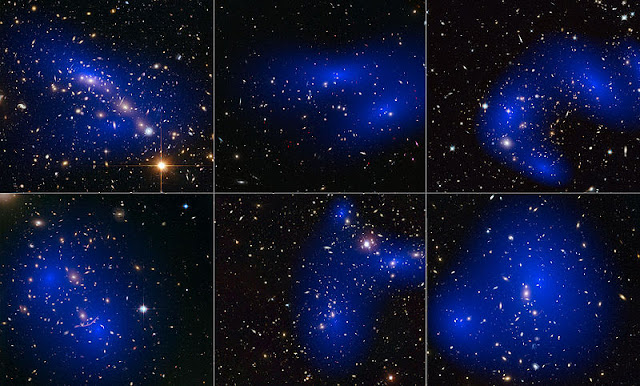 |
| Collage of six cluster collisions with dark matter maps. The clusters were observed in a study of how dark matter in clusters of galaxies behaves when the clusters collide Photo: wikipedia.org |
Professor Erik Verlinde, a researcher from the Delta Institute for Theoretical Physics in Amsterdam, believes that gravity is not an actual force of the universe but an effect due to the increasing entropy of the universe. In his latest paper, which is available on arXiv but is yet to be peer-reviewed, the scientist claimed that this “emergent” (and not real) force of gravity has a dark component that behaves like dark matter.
 |
| Mysterious Universe: Super Force Mysterious Universe |
 |
| Photo: quantumdiaries.org |
"We have evidence that this new view of gravity actually agrees with the observations," said Verlinde in a statement. "At large scales, it seems, gravity just doesn't behave the way Einstein's theory predicts."
 |
| Erik Verlinde, Theoretical Physicist at Amsterdam |
Quite the bold statement from the researcher, especially since it has been shown that Einstein’s general relativity agrees quite well with large-scale observations. In the paper, Verlinde admits that the idea of this dark gravitational component needs to answer several questions before it is able to be as successful at explaining the early universe and large scale cosmology as the current theory of gravity.
The theory of entropic gravity was first proposed by Verlinde in a paper in 2010 and published in the Journal of High Energy Physics in 2011. The proposed idea was welcomed by some as a novel approach to the problem of gravity in quantum mechanics.
 |
| Verlinde's new theory of gravity passes first test Phys.org |
Others were more skeptical and devised ways to see if gravity could really be an emergent phenomenon. In 2011, Archil Kobakhidze of the University of Melbourne looked at how gravity affects fundamental particles. His findings strongly support the idea that gravity is a real force.
Entropic gravity is appealing because it is able to reproduce the laws of Newtonian gravitation and Einstein field equations from the first thermodynamics and quantum mechanical principles, but the theory itself doesn’t make predictions so it can’t be falsified.
Einstein’s general relativity is constantly being tested, and discoveries like gravitational waves have only strengthened its role as the best theory of gravity we currently possess.
Other articles on the same theme:
Story source:
The above post is reprinted from materials provided by IFL Science . Note: Materials may be edited for content and length.
NICE AND INTERESTING ARTICLE
ReplyDelete